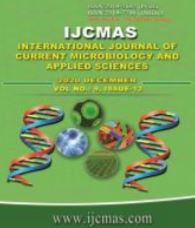


 National Academy of Agricultural Sciences (NAAS)
National Academy of Agricultural Sciences (NAAS)

|
PRINT ISSN : 2319-7692
Online ISSN : 2319-7706 Issues : 12 per year Publisher : Excellent Publishers Email : editorijcmas@gmail.com / submit@ijcmas.com Editor-in-chief: Dr.M.Prakash Index Copernicus ICV 2018: 95.39 NAAS RATING 2020: 5.38 |
In this paper, the global and Indian scenarios about organic farming have been reviewed. In India, the cultivated land under certification is just 2.8 Mha. Yield declines in organic farm conversion, enhancement of soil fertility, introduction of animals, certification restrictions, biodiversity, marketing and policy support are the key concerns arising in organic farming. The potential, especially in the drylands, for organic farming has been discussed. The rise in global awareness of health has made organic farming and organic products more popular globally. Fresh food, rather than a commodity alone, is used as a health element. The new face of Indian agriculture is organic farming, but it faces many challenges. In the near future, intelligent policy, scientific planning, responsible public action and government funding will help to address these challenges. Organic farming supplies macronutrients and micronutrients to plants and thus improves the physical, chemical and biological properties of the soil. Organic farming is considered to be better than traditional farming due to increased human labour, lower cultivation costs, better profits, increased input production capacity and minimized risk resulting to higher incomes, enhanced farmers' self-dependence and socioeconomic stability, and conservation of soil health and climate.
 |
 |
 |
 |
 |